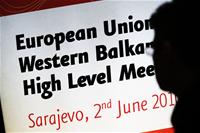Greece wants the Western Balkans in the EU in 2018
Evelyna Topalova, November 24, 2010
 2018, when will be the 100th anniversary from the end of World War I, might turn into a symbolic year for the Western Balkans and their European integration. Greece will work for ensuring support among its European partners this date to become a target for a fully fledged EU membership of the countries in the Western Balkans, the Greek foreign minister Dimitris Droutsas said at a seminar, organised by the Centre for European Policy on November 22 in Brussels. The idea is in 2014 when Athens will hold EU's rotation presidency, a summit to be held - Thessaloniki 2, at which a political declaration to be adopted with a realistic accession date and directions for the candidate countries what steps they need to make in order to have progress. It is even possible "countries-mentors" to be selected that would assist the candidates in fulfilling criteria.
2018, when will be the 100th anniversary from the end of World War I, might turn into a symbolic year for the Western Balkans and their European integration. Greece will work for ensuring support among its European partners this date to become a target for a fully fledged EU membership of the countries in the Western Balkans, the Greek foreign minister Dimitris Droutsas said at a seminar, organised by the Centre for European Policy on November 22 in Brussels. The idea is in 2014 when Athens will hold EU's rotation presidency, a summit to be held - Thessaloniki 2, at which a political declaration to be adopted with a realistic accession date and directions for the candidate countries what steps they need to make in order to have progress. It is even possible "countries-mentors" to be selected that would assist the candidates in fulfilling criteria.
The setting of a specific date is risky because it might feed up redundant hopes and to cause disappointments, but it can also be a powerful stimulus for reforms in the countries of the region. The initially launched by Athens date - 2014 for the EU accession of the Western Balkans - looks even less probable, given the slowing down of reforms, the economic crisis and the enlargement fatigue.
Seven years ago, at a summit in Thessaloniki, the Union confirmed  unequivocally that the Western Balkans have a European perspective, but in order to achieve this goal they have to respond to specific conditions. Almost a decade later Greece, again, wants to play the role of a catalyst of the enlargement process. The truth is that the European perspective continues to be the carrot that makes the Balkan countries reform in order to get closer to certain standards.
unequivocally that the Western Balkans have a European perspective, but in order to achieve this goal they have to respond to specific conditions. Almost a decade later Greece, again, wants to play the role of a catalyst of the enlargement process. The truth is that the European perspective continues to be the carrot that makes the Balkan countries reform in order to get closer to certain standards.
For the majority of people in our geographic area the EU is being associated with the freedom of movement. And since recently this goal is getting closer for most of the countries in the Western Balkans. With a year delay Bosnia and Herzegovina and Albania managed to catch up with Serbia and Macedonia - as of mid-December their citizens will be able to travel visa-free in the EU.
The Kosovo case is different, as the new-born country looks like an isolated island in this regard, because of the problems with recognition of its state status and the insufficient preparedness Kosovo to be included in the visa-free regime. The local authorities have already signaled that this might lead to abuses because more and more Kosovo-Albanians file applications for Albanian citizenship in order to be able to travel freely.
Serious abuses have been registered right after the removal of visas for Serbs and Macedonians. 8,000 Serbs had filed applications for asylum in Belgium, Sweden and Germany since the beginning of the year, according to data released by the Serb foreign ministry. When taking the decision about Bosnia and Albania in November, the EU unequivocally warned that the visa regime could be reintroduced for all Western Balkan countries if systemic violations of the rules are assessed.
 The introduction of a control mechanism is quite familiar to us. Such a mechanism has been introduced with the accession of Bulgaria and Romania to the European Union. Now the Union seems quite cautious and will not close its eyes for any flaws in the accession of Croatia, whose membership is expected to happen in 2012-2013. The EU Enlargement Commissioner Stefan Fule was determined that the Commission would do its utmost to get convinced that the country fulfills the criteria so that it could avoid the introduction of such a mechanism.
The introduction of a control mechanism is quite familiar to us. Such a mechanism has been introduced with the accession of Bulgaria and Romania to the European Union. Now the Union seems quite cautious and will not close its eyes for any flaws in the accession of Croatia, whose membership is expected to happen in 2012-2013. The EU Enlargement Commissioner Stefan Fule was determined that the Commission would do its utmost to get convinced that the country fulfills the criteria so that it could avoid the introduction of such a mechanism.
Without any doubt the European perspective is a strong stimulus and a stabilising factor, but also a reason for skepticism. A recent Gallup poll in the countries of the Western Balkans showed a drop in support for the EU. Most strongly the EU is being supported by the citizens of Kosovo (87%), but it is farthest in reaching this goal. It is interesting that, according to this polls, it is Croatia, which is at the door of EU membership, that is most skeptical. Only 25% of Croatians say EU accession is something good, while the majority would vote against at a referendum.
What can the EU offer to its potential members and does the criticism in the annual progress reports contribute to the increase of euroskepticsm? Obviously Greece understands that more specific talking on the issue is needed, as well as going out of the wishing mode that something will happen "some day". Obviously the Greek diplomats are aware that only concrete parameters of a future European membership would motivate to a sufficient extent the countries in the region. Which, by the way, was repeatedly stated by Turkey, which is also unhappy with the half-way position of the EU. And while we are waiting for Brussels to say its final word more clearly, the candidate countries (and the candidates for candidates) should continue to reform. First for their own sake, and then for EU's sake.
 Bakir Izetbegovic, Andrej Plenkovic | © Council of the EU
Bakir Izetbegovic, Andrej Plenkovic | © Council of the EU Aleksandar Vucic, Recep Tayyip Erdogan | © Serbian Presidency
Aleksandar Vucic, Recep Tayyip Erdogan | © Serbian Presidency Jean-Claude Juncker, Zoran Zaev | © European Commission
Jean-Claude Juncker, Zoran Zaev | © European Commission